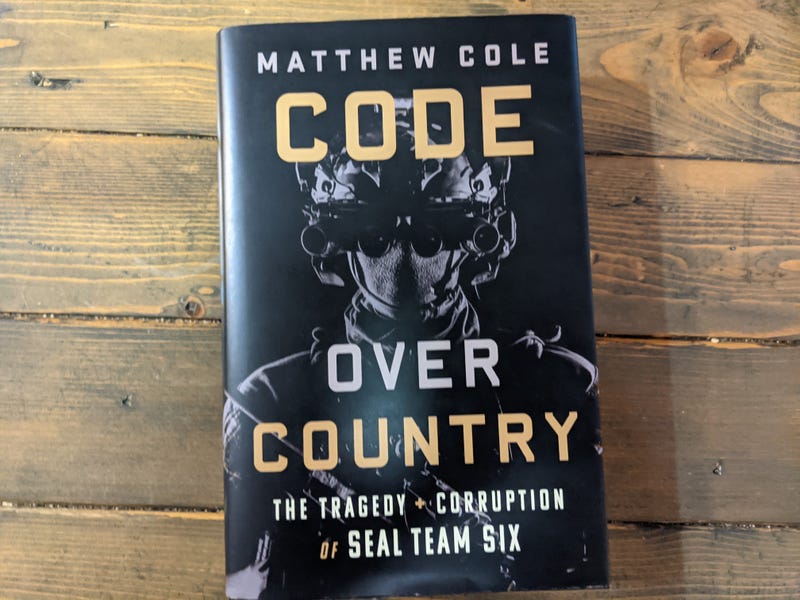
When Special Operations Command investigated itself as a part of a comprehensive review of ethics in the force in 2019, it concluded that there were no systemic ethical issues in Special Ops.
This was despite wave after wave of scandals breaking in the media ranging from the murder of Staff Sgt. Logan Melgar in Mali by Navy SEALs to the monetization of the Bin Laden raid by certain SEAL Team Six operators to much darker allegations about war crimes.
The SOCOM comprehensive review was rebuked just months later by the then commander of Naval Special Warfare, Rear Adm. Collin Green in a memo where for the first time a military leader conceded what the entire country already knew writing, "we have a problem."

The new book "Code Over Country" written by journalist Matthew Cole is the strongest rebuke Special Operations, specifically, the SEAL community has yet faced during the War on Terror.
In some ways, it reminds me of how the military offered up rosy reports about the progress of the Iraqi and Afghan militaries. Commanders sent up false reports saying our partner forces were ready but on the battlefield, the real report card was issued as these militaries quickly collapsed in the face of the enemy.
"Code Over Country" is issuing the real report card, the one that Special Operations Command and Naval Special Warfare have been desperate to hide for decades. While outstanding journalistic works have been produced about the SEALs, such as David Philipps reporting on the Eddie Gallagher case in his recent book "Alpha," "Code Over Country" examines the entire Navy SEAL enterprise, and where it came off the rails.
It also asks the question of how the SEALs can be reformed, when the current Naval Special Warfare commander, according to the allegations in the book is at the center of the war crimes that became prevalent in SEAL Team Six.
In "Code Over Country," Admiral Hugh Wyman Howard III is said to have introduced the carrying and use of hatchets by SEAL Team Six operators overseas even encouraging his men to "bloody the hatchets."
In one episode recounted in the book, Howard stepped into an operations center in Iraq after a mission with blood all over his uniform and lectured the analysts and noncombat troops that the blood demonstrated his leadership as a battlefield commander. Skeptics saw Howard as relying on theatrics to compensate for his lack of leadership ability.
While some of the material in the book has been covered elsewhere, such as the controversy around Britt Slabiniski's Medal of Honor, or Operation Red Wings, Chris Kyle's tall tales, or the mess around former operators publishing books about the Bin Laden raid, "Code Over Country" tells these stories often from new angles, with new details.
Other accounts in the book are shocking and told for the first time. They include the most complete accountings that I have yet to read about the Linda Norgrove rescue mission that went horribly wrong, the Captain Philips rescue which was a success, and the heinous murder of Staff Sgt. Logan Melgar.
Also told for the first time is a story that has long been whispered of in the SEAL community, the tragic death of Ensign Penney who took his own life after the senior NCO in his SEAL platoon got him blackout drunk and sold him to a homosexual in a bar.
There are still darker allegations made in the book of the systemic use of war crimes. Canoeing skulls with gunshots, taking scalps with hatchets, even recording snuff films in one case, and then rewatching enemies on the battlefield bleed to death for entertainment.
Maybe what is most shocking is that much of this has never been reported publicly before, because so many of these indiscretions and crimes are well known within the SOF community, particularly those who went out on operations with SEAL Team Six.
This is where the "Code Over Country" comes in. The code is a conspiracy of silence, one that many more are complicit in than just the SEALs themselves.
As attorney and crime author Andrew Vachss once wrote, "it takes a village to rape a child." The criminals are ultimately enabled by everyone around them who maintains the code of silence.
Reach Jack Murphy: jack@connectingvets.com or @JackMurphyRGR.
Want to get more connected to the stories and resources Connecting Vets has to offer? Click here to sign up for our weekly newsletter.




